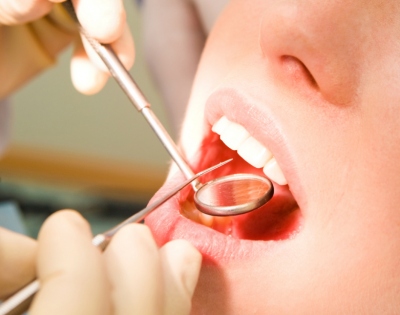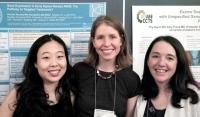Investigating a Link Between Oral Health and Kidney Function

Medical research has already documented a link between cardiovascular disease and periodontal disease, or serious gum infection. Now researchers say preliminary studies suggest a connection between gum infections and kidney disease as well.
“This is a very new and emerging area, and there have only been a few studies,” said Vanessa Grubbs, MD, an assistant professor and neprology specialist in the UC San Francisco's School of Medicine who is determined to advance this research as part of her commitment to preventing the chronic health problems associated with kidney disease.
“If we at least start to show that treating periodontal disease can slow the progression of kidney disease, the long-term ramifications for dental policy and how we manage patients with chronic kidney disease are huge,” said Grubbs, who is also a nephrologist, or kidney expert, based at San Francisco General Hospital and Trauma Center.
Funding routine dental care for people at all income levels could potentially become a priority as a way to prevent kidney disease, and the cost savings would be significant, she said. “It’s certainly cheaper to pay for preventative dental care than dialysis.”
She also noted that both kidney disease and periodontal disease disproportionately impact poorer populations.
Periodontal disease is an inflammatory response to persistent infection, caused by bacteria getting trapped in the gum’s porous tissues. Just as research indicates this inflamed state can affect major organs such as the heart, possibly through bacteria in the blood stream, studies show kidneys are similarly at risk, Grubbs said. Her goal is to prove this link in longitudinal research.
Tracking Kidney Disease in Gum Infection Patients
Teaming up with professors George Taylor, DMD, and Mark Ryder, DMD, from the UCSF School of Dentistry, Grubbs is launching a first-of-its-kind randomized, controlled study to track the progression of kidney disease in patients receiving treatment for periodontal disease.
All patients will have both conditions. Two-thirds will receive immediate and follow-up periodontal care, and the remaining control group will receive the dental care if it’s medically necessary. Kidney function will be measured in several ways, such as analyzing unique biomarkers in blood and urine associated with kidney damage.

Vanessa Grubbs, MD
Grubbs received research funding from the National Institutes of Health (NIH), and plans to follow the patients for one year as a pilot study, which could be expanded based on results.
After years in the preliminary stages, the study received a major boost from the K Scholars program managed by UCSF’s Clinical and Translational Science Institute (CTSI), said Grubbs, who was a K Scholar in 2011.
The K Scholars program is designed to support the career development of junior faculty from all UCSF schools who are committed to building careers in clinical and translational research. The program provides support for scholars to conduct high quality research, foster and nurture multidisciplinary collaborations and explore novel research directions, and develop the range of skills necessary to achieve a successful independent academic research career. Types of support include partial salary funding, expert advice, mentoring and regular project review sessions with a multidisciplinary group of K Scholar peers.
“Dr. Grubbs’ research is really innovative and speaks to the idea that poor health in one area of the body may be related to poor health in other areas – even very different areas like gum infections and kidney disease, which most people would never think may have an effect on each other,” said Louise Walter, MD, associate director of CTSI’s Career Development (KL2 Scholars) Program and professor in residence at the School of Medicine.
“The big push of my K award is to conduct the pilot study,” Grubbs said. “The statistical help is great; but it’s also nice just to have a group of people, other researchers, to trouble shoot with and to talk through project ideas. It’s helpful to know what kinds of issues others have come up against, and how they’re dealing with them.”
UCSF's CTSI is a member of the Clinical and Translational Science Awards network funded through the National Center for Advancing Translational Sciences (grant Number UL1 TR000004) at the NIH Health. Under the banner of "Accelerating Research to Improve Health," CTSI provides a wide range of resources and services for researchers, and promotes online collaboration and networking tools such as UCSF Profiles.
